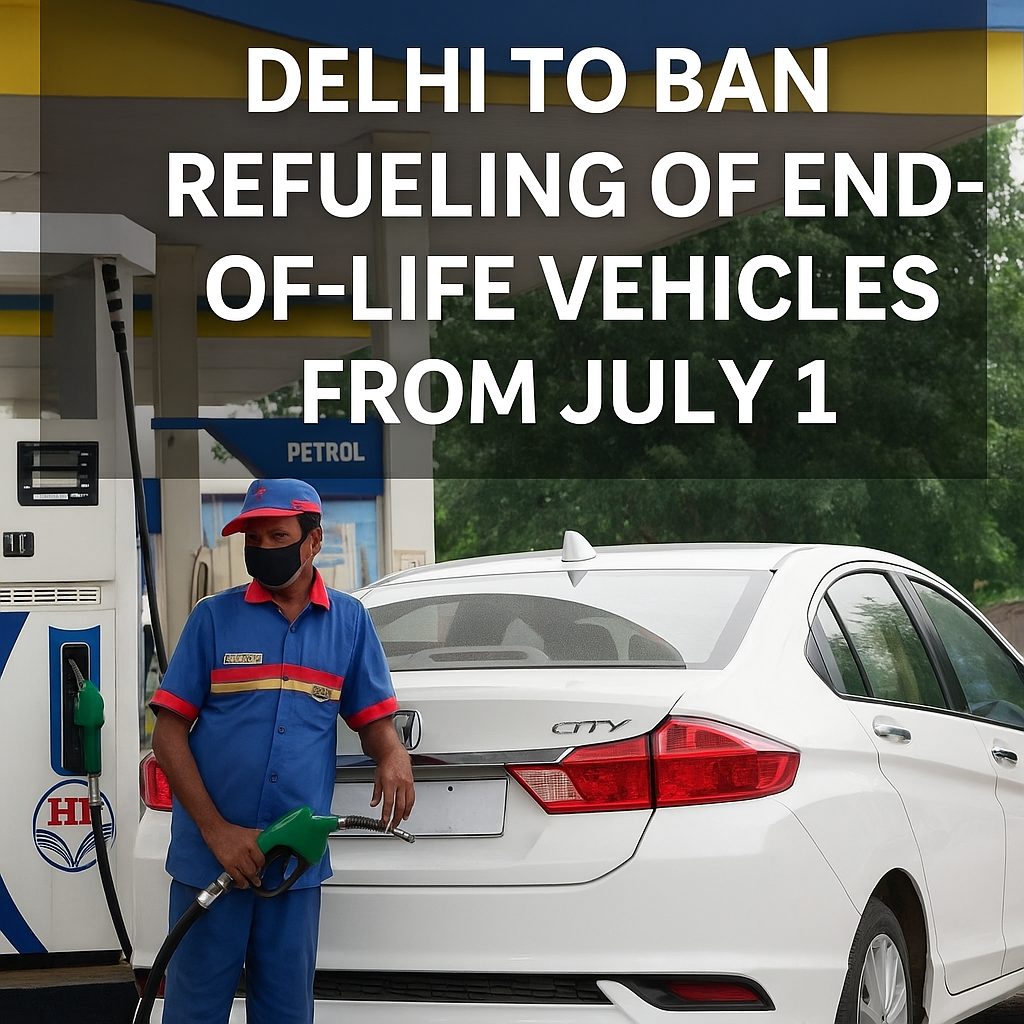Policy Shift Aimed at Combating Delhi’s Air Pollution Crisis
Starting July 1, 2025, the Delhi Transport Department will enforce a blanket ban on refueling End-of-Life Vehicles (ELVs) at petrol pumps across the capital. This applies to petrol vehicles older than 15 years and diesel vehicles older than 10 years that are registered in Delhi, as per the National Green Tribunal’s (NGT) directives.
The Enforcement Plan: What Will Change?
In a notification issued by the Transport Department, authorities confirmed that fuel stations across Delhi will be instructed not to refuel ELVs, including those not yet deregistered but falling under the banned age limit. The policy is aligned with Rule 52 of the Central Motor Vehicles Rules, which mandates deregistration and scrappage of unfit vehicles.
Direct Statement from the Delhi Government
“We are taking this step to strictly enforce NGT orders and reduce vehicular emissions, which remain a major contributor to Delhi’s toxic air,” said a senior official from the Delhi Transport Department, speaking on condition of anonymity.
Officials further stated that the ban will be strictly monitored, and violators—including fuel station operators—could face penalties or suspension of licenses.
What Happens to Vehicles Registered Outside Delhi?
This refueling ban specifically targets vehicles registered in Delhi. Owners of older vehicles from neighboring states will not be restricted from refueling within the capital. However, such vehicles are already prohibited from entering Delhi during high-pollution periods under the Graded Response Action Plan (GRAP).
What Is an End-of-Life Vehicle (ELV)?
An ELV is classified as:
- Petrol vehicle older than 15 years, or
- Diesel vehicle older than 10 years, registered in Delhi, irrespective of its running condition or fitness status.
These vehicles are considered to pose high environmental and safety risks and are often flagged in pollution and traffic violation databases.
Ground-Level Implementation
Fuel pump associations across Delhi have confirmed receiving circulars and directives regarding this move.
“We’re being briefed on how to verify vehicle eligibility before refueling. It may slow down service initially, but we support clean air initiatives,” said Rajinder Singh, manager at a major South Delhi petrol station.
The use of automatic number plate recognition (ANPR) and RTO integration is being considered to support enforcement at the pump level.
What Should Vehicle Owners Do Now?
Owners of affected vehicles are advised to:
- Check their RC status on the Parivahan portal
- Initiate scrappage via authorized scrapping facilities
- Avoid using deregistered vehicles, even on private property, to stay within legal bounds
The government has also encouraged owners to opt into the Vehicle Scrappage Policy, which offers financial incentives for scrapping old vehicles and upgrading to cleaner models.
A Step Towards Cleaner Urban Mobility
Environmental groups have cautiously welcomed the move. Sunita Narain, Director General of the Centre for Science and Environment, noted in a statement:
“This is a significant step, but it must be part of a larger, sustained strategy involving public transport, vehicle electrification, and stricter inspection regimes.”
Delhi has faced severe air quality issues, often ranking among the most polluted cities globally. While the ELV ban alone may not offer a complete solution, it reflects growing urgency within the administration to target long-term polluters.
Frequently Asked Questions (FAQs)
What are End-of-Life Vehicles (ELVs) in Delhi?
ELVs refer to petrol vehicles older than 15 years and diesel vehicles older than 10 years, registered in Delhi. These are no longer considered road-legal under the NGT order.
Is the refueling ban applicable to vehicles from other states?
No. The ban applies only to ELVs registered in Delhi. However, vehicles from outside Delhi may still be restricted from entering the city during pollution control phases under GRAP.
Will there be penalties for refueling an ELV?
Yes. Fuel stations found refueling ELVs can face penalties and possible license suspension. Vehicle owners may also be fined if caught operating banned vehicles.
How will fuel stations identify ELVs?
Fuel stations will use RC verification and may soon be equipped with systems linked to the Parivahan database or ANPR technology to detect ELVs.
What should I do if I own an ELV?
Owners should initiate scrapping procedures through authorized vehicle scrappage centers. The government may offer incentives under the Vehicle Scrappage Policy.
Is this part of a larger pollution control initiative?
Yes. This ban is one of several steps under Delhi’s clean air strategy, alongside vehicle electrification, tighter emission norms, and GRAP enforcement during winters.

